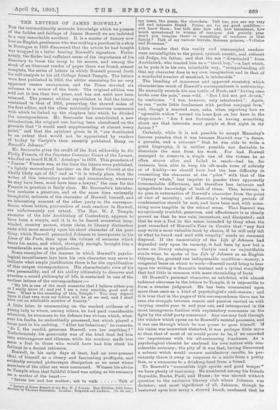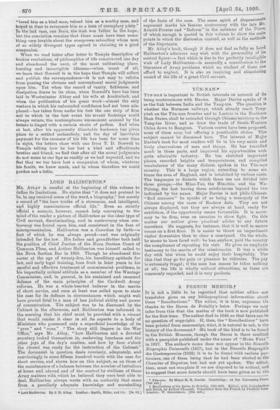THE LETTERS OF JAMES BOSWELL.* FOR the extraordinarily accurate knowledge
which we possess of the foibles and failings of James Boswell we are indebted to a very remarkable accident. It is a matter of history now how an English gentleman who was making a purchase in a shop in Boulogne in 1850 discovered that the article he bad bought was wrapped in a letter bearing Boswell's signature. Fortu- nately, the finder bad sufficient sense of the importance of his discovery to trace the scrap to its source, and among the stock of an itinerant vendor of paper there was found, almost complete, the series of letters in which Boswell poured forth his self-analysis to his old College friend Temple. The letters were first published in 1856, the editor remaining for no very apparent reason anonymous, and the Times devoted six columns to a review of the book. The original edition was sold out in less than two years, and has not until now been
reissued. The present edition republishes in full the letters contained in that of 1856, preserving the shrewd notes of the first editor, and the often satirically humorous comments with which he linked up the chapters into which be divided the correspondence. Mr. Seccombe has contributed a new introduction, the original one having been abandoned on the grounds that "it would need supplementing at almost every point," and that the opinions given in it "are dominated to an extent that would not be appreciated by readers
of to-day by Carlyle's then recently published Essay on Boswelrs Johnson."
Mr. Seccoinbe gives the credit of the first editorship to Sir Philip Francis, of the Supreme Consular Court of the Levant, who died on hoard H.M.S. 'Antelope' in 1876.. This grandson of "Junius" Francis wee, at the time the letters were published, "a lightly encumbered barrister on the Home Circuit at the Wholly likely age of 34," and as "it is wholly plain that the writer of this intercalary matter and commentary, whatever he fluty have ,been, must have been a lawyer," the case for the Francis in question is fairly clear. Mr. Seccombe's introduc- tion contains a generous, and at the same time eminently thoughtful, estimate of the character of Boswell himself, and an interesting account of the other party to the correspon- dence, whose letters, provocative of such candour in Boswell,
are 'unfortunately not extant. The Rev, W. J. Temple, ancestor of the late' Archbishop of Canterbury, appears to have been a simple, and it is to be feared somewhat long- winded, country parson, whose claim to literary distinction rests with more security upon his short character of the poet Gray, which Boswell persuaded Johnson to incorporate in his Lives of the Poets, than upon the volume of sermons which bears his name, and which, strangely enough, brought him a considerable sum on its publication.
Some examples of the manner in which Boswell's psycho- logical incontinence lays bare his own character may serve to indicate what ample justification there is for the republication of this unique correspondence. His characteristic view of his Own personality, and of his ability ultimately to discover and Practise a sound philosophy of life, is contained in one of the earliest letters of the correspondence :—
"My life is one of the most romantic that I believe either you or I really know of ; and yet I am a very sensible, good sort of raan. What is the meaning of this, Temple ? You may depend upon it that very soon my follies will be at an end, and I shall turn out an admirable member of Society."
A little later, in commenting on the marked coldness of a young lady to whom, among others, he had paid considerable attention, he summons to his defence two virtues which, what- ever his faults, lie undoubtedly possessed, but which played it large part in his undoing. "After her behaviour," lie remarks, 'do I, the candid, generous Boswell, owe her anything P" *Unfortunately, his generosity was of the kind that led him into extravagance and idleness, while his candour made him 8eetn a fool to those who would have had him cloak his failings in a decent reticence.
Boswell, in his early days at least, had an ever-present ideal of himself as a cheery and fascinating profligate, and evidently counted picturesque dissipation SS an asset where members of the other sex were concerned. Witness his advice to Temple when that faithful friend was acting as his emissary on a matter of the heart:—
" Salute her and her mother ; ask to walk Talk of • Letters or James Emmett to the Rev. W. J. Temple. New Edition, with Intro. duction by Thomas Se000mbo, London Sidgwick end Jackson. 17s. 3d. net.1 my mare, the purse, the chocolate. Tell bar, you aro my very old and intimate friend. Praise ma for my good qualities — you know them ; but talk also how odd, how inconstant, how much accustomed to women of' intrigue. Ask gravely, pray don't you imagine there is something of madness in that family ? Talk of my various travels, German princes, —Voltaire and Rousseau."
Little wonder that this vanity and unexampled candour were unintelligible to the proud, cynical, caustic, and reticent
old Judge, his father, and that the son " divaricuted" front Auchinleck, who treated him as a "timid boy,"—a fact which, as he puts it in his own inimitable way, " comprehending all that my character does in my own imagination and in that of a wonderful number of mankind, is intolerable."
The blending of innocence and apparent casuistry which characterises much of Boswell's correspondence is noteworthy.
He unwarily exceeds his one bottle of Hock, and" having once broke over the pale," runs wild. "But I did not get drunk,"
he continues. "I was, however, very intoxicated.", Again, he can "unite little fondnesses with perfect conjugal love," and, though a married man, asks, when reporting how an "agreeable widow" nursed his lame toot on her knee in the stage-coach "Am I not fortunate in having something about me that interests most people at first sight in my
favour P" • Certainly, while it is not possible to accept Macaulay's famous paradox that it was because Boswell was "a dunce, a parasite, and a coxcomb" that he was able to write a great biography, it is neither possible nor desirable to dissociate the man from his work. For had Boswell managed to conserve a single one of the virtues he so often strove after and failed to reach—had he, for instance, been able to keep his oft-made vows of sobriety or of fidelity—we should have had the less difficulty in reconciling the character of the " pilot " with that of the "literary whale," less impulse to ponder their apparently irreconcilable differences, and therefore less intimate and symputhetio knowledge of both of them. This, however, is no plea in extenuation of Boswell's character from the point of view of morality ; and Macaulay's swinging periods of condemnation should be met, and have been met, with some- thing more tangible in the ethical sense. That Boswell was scrupulously truthful, generous, and affectionate is as clearly proved as that he was vain, inconstant, and dissipated; and that he was a fool in the sense intended by Gray when the poet remarked of Boswell's Tour in Corsica that "any fool may write a most valuable hook by chance, if he will only tell us what he heard and said with veracity," needs no reasoned disproof. If the immortality of the Life of Johnson had
depended only upon its veracity, it had been by now but a name on library catalogues. Carlyle used no unjustifiable simile when he spoke of the Life of Johnson as an English Odyssey, for, granted one indispensable condition—namely, a congenial basis on which to work—Boswell could bring to bear upon his writing a dramatic instinct and a lyrical simplicity that had little in common with mere chronicling of facts.
Of Boswell's. personal character, as exhibited with almost indecent clearness in the letters to Temple, it is impossible to form a concise judgment. He has been commented upon more than once as a kind of psychologist's vade-mecunt ; and it is true that in the pages of this correspondence there can be seen the struggle between reason and passion carried on with varying results year in and year out, and interspersed in the most incongruous fashion with explanatory comments on the fight by the chief party concerned. Any one may look through the window Which opens on to Boswell's mental processes, and it was one through which he was prone to gaze himself. lf his vision was somewhat distorted, it was perhaps little more so than that of most of us would prove to be, if we recorded our impressions with his all-embracing frankness. As a psychological chemist he analysed his own nature with con- siderable accuracy ; the pity of it was that, having discovered a solvent which would eusure satisfactory results, he per- sistently threw it away in response to a smile from a pretty
face, or a summons to a drinking-bout front a friend.
To Boswell's " irresistible bight spirits and good temper" we have plenty of testimony. He numbered among his friends Reynolds, Burke, Paoli, and Hume; he was elected without question to the exclusive literary club whore Johnson was dictator; and most significant of all, Johnson, though he bestowed upon him many a shrewd knock, confessed that he
"loved 'him as a kind man, valued him as a worthy man, and hoped hi tithe to reieretice him as a an of exemplary piety." .tn the latit ease, one rears, the wish wee father to the hope ; but the conviction remains that there must have been some- thing very lovable about the overgrown uchoolboy whom men of so widely divergent types agreed in claiming es a good companion.
When we read letter after letter to Temple descriptive of broken resolution, of philosophies of life constructed one day and abandoned the next, of the most unblushing place- bunting and ieeorrigible idleness—when, Worst of all, we learn that Boeweli is in the hope that Temple will collect and publish the correspondence—it 18 not easy to refrain from passing the obvious and Conventional moral judgments upon him. Yet when the record of vanity, fickleness, and dissipation draws to its close, when Boswell's hero has been laid in Westminster Abbey and his Wife at Auehhileck, and when the publication of his great work—almost the only venture in which his unbounded confidence had not been mis- placed—has taken from under his feet the otie strip of firm soil to whioh in the last event his errant footsteps could always return, the Contemptuous ateuierhenb aroused by the letters is tinged with a certain strain of pathos. And when at last, after his apparently illimitable bonhomie lute given place to a 'settled melancholy, and the day of inevitable payment for the excesses of his life has been for some time in eight, the letters dose with one from T. D. Boswell to Temple tellifig bow he has lost a kind and affectionate brother and friend, we fled that after all the moral judgments do not ootue to our lips eft readily ail we bad expected, and we feel that we too have lost a companion of whorn, whatever his faults, we knew much, and in whom therefore we could tiardon not a little.























































 Previous page
Previous page